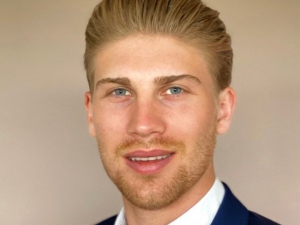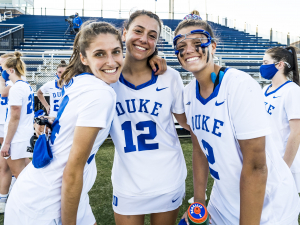MMS Capstone Reflection with George Grody

Students who earn the MMS certificate take a capstone course their senior year. While each of the capstones teach the same core values, the instructors lead the courses slightly differently, creating unique experiences for MMS students. George Grody’s capstone is centered around a simulation through Capsim where six teams of four compete as CEOs of microprocessor chip companies. The product itself is less relevant than the implementation of business decisions related to design, marketing, production, finance, and ethics. The semester is broken into 11 weeks where each week counts as a year of the company and your team is scored based on metrics relative to the other teams in the class. Through these 11 weeks, students learn terminology and general business terms, participate in the business competition, and give two-hour presentations reviewing their company over the course of the simulation.
Grody explained that he models his capstone around this simulation in order to give students more concrete business experience.
“At school and college, you learn about things rather than learning how to do them,” he explained. “Using simulations where you have to analyze data, make decisions, respond to data, work in a team, deal with good and bad outcomes based on your decisions is the closest experience to approximate real life. The best way to learn something is to do it repeatedly; In Capsim, you run through the simulation 11 times.”
Grody hopes that the course and the simulation prepare students for whatever path they take next. Two of those students, former MMS Ambassadors and recent graduates Bryan Edwards and Katherine Vieser, reflect on their time completing the MMS certificate and taking the MMS capstone course with Grody.
Bryan’s Takeaways
One of the key takeaways from Grody’s class is the importance of not being afraid to fail and learn from your mistakes. The class is designed where you do three practice rounds before the real simulation begins so you can test out how decisions like launching a new product or paying off debt early will impact your business in the long-term. However, you cannot test everything throughout the three weeks and will likely face difficult decisions during the simulation where you will often make the wrong choice. For example, my team incorrectly changed the design specs for one of our products and underproduced certain products which impacted our ability to maximize our profits and market share. Each week, we would reflect on our decisions to make slight adjustments to counteract our misjudgments from the previous years. The true value of the class thus came from learning from our mistakes which is something that will directly translate to working in the real world after college.
The other key takeaway for me was learning the terms and concepts used in the simulation. Understanding the financial segment of the simulation and the reasoning behind how certain financial decisions influence the larger operations of the company was the most useful for me. For example, you will learn how selling common stock is a strategy to bring more cash into a company for a wide range of purposes, such as launching a new product. Given that I am interested in going into sports, I read newsletters, like Front Office Sports, which have business jargon that I would usually skim over because I did not fully understand what was being discussed. Following Grody’s capstone, I have been able to have a much better understanding of the articles, such as why Peloton would sell a certain amount of common stock, to enhance my knowledge of the industry. The financial segment of the simulation was most impactful for me, but it was also great to learn the other segments including design, marketing, and production as well as how to interpret a proforma and financial statements, like an income statement and balance sheet.
Katherine’s Takeaways
Grody’s class was one of a kind. As a fan of Grody’s classes in the past, I was immediately interested in taking his Capstone course; it did not disappoint. The class was structured around a simulation in which your assigned team acted as the CEOs of a company. Throughout the semester, you are tasked with making choices for your company ranging from marketing costs to ethics decisions. All of these decisions contribute to your company’s success which is recorded in comparison to the other teams each week.
Engaging in this simulation provided what felt like real-life experience. Each decision had to be made in conjunction with the others and with the support of your team. Unlike other classes that focus on textbook readings, Grody provided supplemental readings to add to our understanding of the decisions we were making. Even with this, completing the decisions ourselves and watching which strategies worked and failed was ultimately the most rewarding. Additionally, Grody’s history in the field enabled him to provide unique insight that was truly invaluable. This “real life” experience taught me ways to adapt to unexpected challenges, the value of working in a team and the significance of failure as a learning experience.






